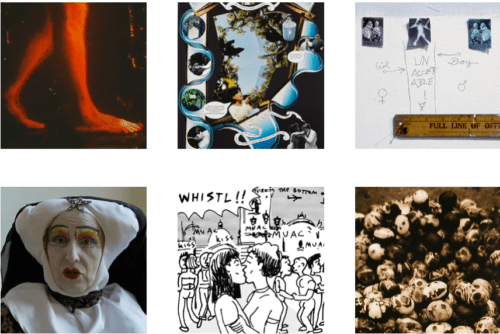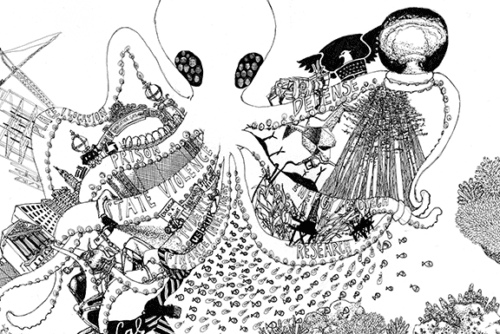To understand the significance of this changing sick role, I want to return to Rose’s model: Max Weber’s analysis of early capitalism as entailing the emergence of a new spirit. The worldly asceticism that Weber thinks emerged at this time also hinged on a sexual politics. As Janet Jakobsen has written: “Luther and Calvin do not encourage those with a religious vocation to leave the monastery and convent and live alone as pure autonomous individuals. Luther and Calvin encourage them to get married, and this is because, as feminists have long pointed out, autonomous individuals do not actually exist autonomously.”1 It was sexuality disciplined through “marriage, devotion to a family, and to a calling” that freed the reformed individual “from greed, ambition, and other lusts of the flesh,” putting the asceticism into this worldliness and making it as an ethic.2 Jakobsen notes that while monks took vows of poverty and communal obedience as well as celibacy, when Calvin attacked monasticism he did not even mention the first two vows. In the re-working of material relations that was underway in the sixteenth century, “sex comes to stand in for right relation to the material world and right relation between God and community.” This is the moment in the West when “undisciplined sex replaces gluttony as the sin extraordinaire.”3
Today, sex still stands in for material relations. Its disciplines still provide support for lyrical forms of preaching and promise. In a world that dreams of rendering even waste productive, medicine’s sexual sermons authorize specific expectations regarding what makes life worth living and dying for. “The problem, as I see it,” remarks Veena Das, “is that once the idea of God as author of nature and time is displaced and the political body is seen as subject to death and decay, secular means have to be crafted to ensure that the sovereign receives life beyond the lifetime of individual members. Thus the state has to re-imagine its relation to the family in more complex ways than simply assigning the family to the realm of the private.”4 Contemporary molecular medicine is one site where sovereignty’s relations to ‘the family’ are being re-imagined. Hence the importance of sexual sermons, which preach the pleasures and responsibilities of the family romance. Anthony Giddens argued this point long ago: romance is about controlling and speculating on the future.5 Routing sexuality through ‘the family’ is a primary way in which Americans recognize themselves as free. Thus we see in recent political discourse the claim that Western ‘tolerance’ of homosexuality proves that Western civilization offers greater freedom than ‘Islamic civilization.’6 “Americans understand ourselves to be a free people,” writes Jakobsen, “and part of the proof of that freedom lies in the way we pursue our sexuality.”7
When medical science takes as its project the task of touching life itself through a touch whose intervention is so small it can become ‘smart,’ forms of sexualized personhood re-emerge as a privileged locus for the conduct of our conduct.8 In an economy which aims to make everything productive—debt, waste, our capacity for future capacity—the scientific secular focuses relentlessly on the family as it engenders complex desires for ordinary life and thereby, for the pleasures and everyday intimacies of conventionality itself. Molecular medicine acts as (what Lauren Berlant calls) an intimate public: juxtaposed to the political without necessarily going there, medical discourses deploy ‘sexuality’ in ways that promise us freedom—especially vis-à-vis our bodily fate(s)—even as these same sexual sermons re-structure the conjunction of experiences that we call ‘sexuality.’ To call these discourses ‘sexual sermons’ is not to argue that that sexuality ‘functions like’ a religion.9 It is, rather, to pinpoint particular practices through which secular expectations surrounding the body and its vitality draw force from long-standing religious sensibilities in which sexuality stands in for ethical relation to the material world. We respond to their force, believe in the body (as Nietzsche put it), whether or not we profess or practice Christianity. These historically specific forms of belief in the body constitute a crucial matrix of everyday life and experience that joins knowledge, normative actions, and technologies of self into an apparatus by which we are both governed and govern ourselves.
- J. Jakobsen, “Sex + Freedom = Regulation: Why?” Social Text 84:85 (2005): 297. [↩]
- Jakobsen, 290 and 295. [↩]
- J. Jakobsen, “Sex, Secularism, and the ‘War on Terrorism,” in A Companion to Lesbian, Gay, Bisexual, Transgender and Queer Studies, M. McGarry and G. Haggerty, eds. (Malden, MA: Blackwell, 2007): 24. [↩]
- V. Das, “Secularism and the Argument from Nature,” in Powers of the Secular Modern (Stanford, CA: Stanford University Press, 2006): 94. [↩]
- Anthony Giddens, The Transformation of Intimacy: Sexuality, Love and Eroticism in Modern Societies (Stanford, CA: Stanford University, 1992): 57. [↩]
- J. Puar, Terrorist Assemblages: Homonationalism in Queer Times (Durham, NC: Duke University Press, 2007). [↩]
- Jakobsen (2007): 19. [↩]
- Foucault (2007). [↩]
- In elaborating on Foucault’s analysis of secularization as ‘in-depth Christianization,’ I am arguing against the usual way that medical anthropology attends to religion: as a Geertzian ‘calculus of meaning.’ For this approach, see the volume of Culture, Medicine and Psychiatry devoted to exploring the reception of assisted reproductive technologies among various ‘world religions’ [R. Rapp, “Reason to Believe,” Culture, Medicine and Psychiatry 30 (2006): 420]. While important, limiting the exploration of religion and biomedicine to an identification of religion with tradition misses much of religion’s power in the modern world. What study of the body contributes to sociological accounts of secularization is an ability to see how religiosity and its lyricism inflect ‘our bodies, ourselves’: as a form of cultural memory, religion happens without anyone needing to believe, profess, or practice. [↩]



